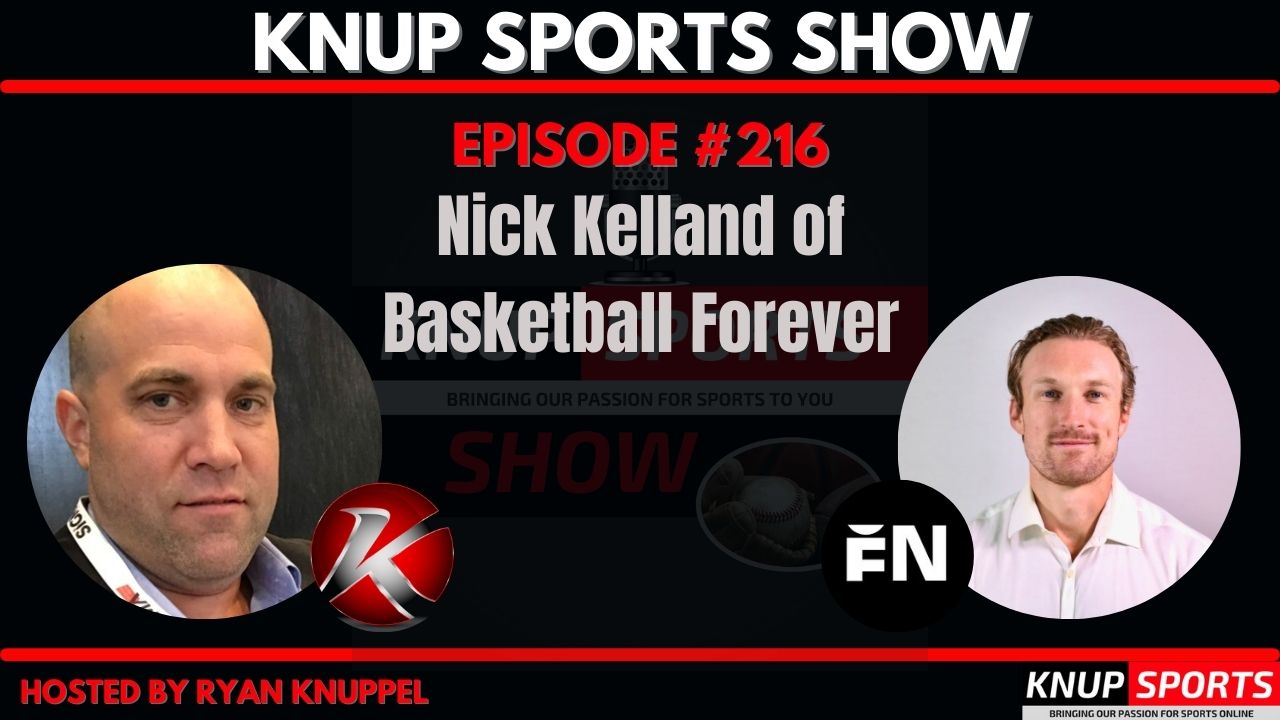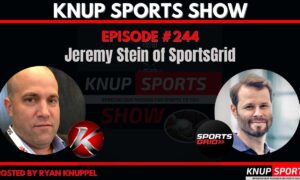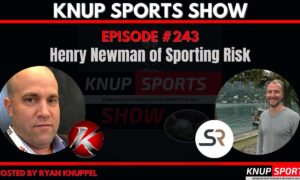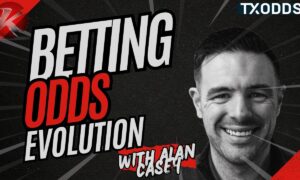Nick Kelland of Basketball Forever joins the show to talk about how the Forever Network got it’s start, plus where they are headed with engaging games for their audience.
Ryan Knuppel:
Hey, hey, hey, what’s going on, everybody? Ryan Knuppel here, Knup Sports Show, episode 216. It has been a while. I am glad to be back.
I believe our last show was late 2023. So, this is potentially the first show of 2024. I’m trying to rack my brain, but I’m excited to bring you a bunch of new interviews with great leaders across the sports industry. That’s what we do. That’s what we enjoy.
And I have a great lineup of people set for 2024 that… We can bring you their story. That’s what I enjoy doing. I enjoy telling people’s story and what they’re up to. So hopefully, you’ve all been well. Hopefully, you’re enjoying the iGaming Next conference this week in New York City. I did not. I was not able to attend this conference, unfortunately, but my brother is representing the Neupel brothers there. So he’s at the conference having a good time while I sit at home hanging out with kids and family. But that’s that’s another story for another day. Hopefully, you’re enjoying that show.
All right. As I mentioned, we have a ton of great guests lined up and we have an awesome one today that I’m super excited to get to know and get to know what their company’s doing. So I’m going to go ahead and bring him on today. We have Nick Kelland. Nick, how you doing? Nick’s with Basketball Forever. How you doing, Nick?
Nick Kelland:
Good, man. Good to be here. 216 episodes is a pretty significant shift. It’s good to have you back for the year as well.
Ryan Knuppel:
Yeah, man. It’s been a journey. That’s over three or four years. So we’ve kind of just strung a whole bunch together. And before you blink, you’re at 216. You’re like, whoa, how did we do that? So amazing to have you on. I’m super excited to be here with you. I appreciate you having me. It should be fun.
Awesome. Well, cool. Well, Nick, as we typically do, we like to dive into you first. So I’d love to hear what makes you tick, maybe where you’ve been in your career journey that led you to where you are today. So why don’t you give us a little bit about yourself?
Nick Kelland:
Yeah. So I live in New York. Originally, I’m from Australia. You can probably hear from the accent. My background, I guess, was carved out in sports media. We went sort of a roundabout way back to where I am today, but started in sports media essentially from when I was like 16, 17 years old, did the whole unpaid internship route and getting exposure to different pro sports setups back home.
Um, eventually was working for a company called channel nine in Australia was running their coverage of sort of like the ashes, which is, call it that in the world, between Australia and England. And then some stuff around like the FIBA World Cup. Basketball has always been a big part of my life, but I’ve just been a sports nut. Moved from sort of like the content creation side, I would say, in digital media and broadcast media. Just got very lucky to land a job at a company called Immutable back home in Sydney. Was sort of an early employee there. That company ended up growing quite fast. Came across to the states about two years ago um and was looking at sort of business development and the strategy side of my career that was picking back up um and then all of that sort of came to an inflection point around sort of nine months ago when forever network or basketball uh have launched an eye gaming product or a fantasy product if you want to call it um that was doing gangbusters and the media scale was continuing to sort of blow up so um we raised some money brought the business over to the states and now I look after sort of the strategy side um over here so that’s been my career in a very very short nutshell.
Watch This Episode of the Knup Sports Show
Ryan Knuppel:
Very short nutshell, but I’m sure there was a lot of great experiences through that journey that led you there today. And, you know, I want to dive right into where you’re at today. So you mentioned Forever Network, Basketball Forever. Give us a little, you know, for those that haven’t heard of Forever Network or Basketball Network, give us the 10,000 foot view of what the company is and what you guys are up to.
Nick Kelland:
Yeah, so forever network is the the parent company of our flagship brand basketball forever basketball forever is a social sports publisher that was founded in excuse me founded in 2015 back in sydney australia um and in the last nine years we’ve grown that digital account that that sort of independent media publisher had to be the number one ranked global sports media company amongst millennials by engagement um and you know we say millennials is a bit of a catch-all term it’s loosely sort of like 18 to 35 36 years old um you know we’ve grown that that masthead uh with a sort of distributed social model around 20 to you know 25 year on year in subscriber and follower metrics and we’ve now reached a sort of critical mass on the audience side with basketball specifically so last year in the in the 2022-23 nba season we did 4 billion content impressions And we were really proud to reach sort of 260 million people unique across the world. And so that was sort of, I guess, how the business has started and scaled over the last eight years. We’ve got a really, really talented team of creators and you know people who work across visual design and illustrative features and different bases on that side uh so we built sort of critical scale there and then the reason I guess like where where we got connected and um you know the capital we’ve raised over here and where we’re now moving is we’re pivoting the business or moving it from what more of like a media focused independent media approach into a native product experience company. So specifically operating in the fields of sort of like iGaming and fantasy. So we launched a beta of a non real money pick’em really, really simple concept essentially. every morning you would log into the application. You would have five binary questions that were presented as digital trading cards. There were no monetization rails. It was very much just to get a temperature check on how our audience liked to sort of transact and where they liked to dedicate their energy on. sort of like an owned and operated second screen. But the interesting thing we built with this Pick’em was that the markets were dictated not by sort of, you know, data feeds and betting APIs that were dictated by what was trending in the media ecosystem. And we used that as our sort of like ability to acquire users at very, very low cost to build that sort of like, you know, I guess, UA and retention flywheel. The beta did extremely well. We realized that we had sort of significant in sort of a number of global regions. And that was enough for us to go and sort of raise capital with some really, really good investors over here, both sort of from an angel standpoint and then a couple of institutional checks. And our goal is basically to launch a suite of disruptive and sort of And the idea is that we want to capture and engage this global audience of sort of mobile first multi-screen sports lovers, funnel them into a product that sort of taps into that cycle. And then obviously what comes with that is expanding the international business operation, looking at new media opportunities, new B2B partnership opportunities. But we reach 45 million US people a month. We reach 35 million people in the Philippines a month. We’re at significant sort of audience scale in Canada, Australia, Europe, Latin America, Brazil, Mexico, you name it. So the ability now, we’ve sort of done the hard work to be able to get to that point. And now it’s about trying to build really, really interesting product experiences that monetize in a smart way moving forward.
Ryan Knuppel:
Wow. Yeah. Congrats on all the success with the brand and the brands that go along with it. I have so many questions, but a couple just really high level basic questions. One, explain to the audience the because because I noticed on Basketball Forever, I mean, very NBA focused, right? Very NBA focused brand. Explain for us in the U.S. that maybe aren’t familiar with like Australian culture or something like that. The NBA interest over in Australia has to be big as well, correct? Just give me a little bit of cultural education there. Is it a huge sport over in Australia as well?
Nick Kelland:
Everyone’s sort of, I think, I’ll preface it by saying that I think Australian basketball has been put more on the map, considering our sort of, I guess, like global success in the last few years. We obviously got a bronze medal at the last Olympics, but we’ve got, you know, Australia has had multiple number one draft picks. Yep. Australia. Andrew Bogut, obviously Ben Simmons, you’ve got new guys like Josh Giddey, people like that who are sort of, you know, flying the flag a little bit, but we now have sort of double digit players in the NBA who are Australian born and raised. But more importantly, from a viewing standpoint, Australia is now the most popular sport in sorry, bus numbers, supersedes cricket, supersedes soccer, everything. And from an NBA watching perspective, there’s two things that make it so big and so successful there. So one is we are per capita the biggest consumers of NBA league pass in the world. So it’s like a bit of a sleeping giant, I would say. But you wake up at 9 a.m. in Sydney, Australia, or 6 a.m. in Perth, wherever you may be, and the NBA is on all workday. So you have really, really prime time viewing hours. And that’s actually the reason that our content team still sits in Australia, because you get the East Coast and the West Coast coverage, and then through the afternoon and the evening, we can touch all those things. Whereas if you’re an East Coast-based basketball reporter in the US or bought from New York you know some of those games out in Denver will finish at 1 in the morning right 1 or 30 in the morning depending on you know you got a single or double OT and then you have presses and so yeah Australia is just like it’s a really nice melting pot both from a a growing popularity piece um a propensity to want to spend both time and money on these things and then obviously the viewing time and then I’ll bookend all of that by saying that Australia is um you know, anyone who’s in this industry understands that Australia is like, you know, I like to call it sort of the gambling capital of the world. You know, we’ve been betting on mobile phones for 15, 20 years, right? In many ways, the landscape has been paved there with a lot of stuff. And yeah, I think, you know, again, from a JDPay standpoint, we are some of the biggest gamblers in the world. So basketball is a very, very like repeatable gambling pawn product. So yeah.
Ryan Knuppel:
Cool. Well, thank you for that education. Appreciate it uh for sure. And it is really, really interesting to see the growth of, you know, the sport worldwide and, and when you name some names and some things like that, it kind of, oh yeah, you’re right, like there is so much presence outside of the United States worldwide in this sport now that uh, you know, really started in the United States but now has just grown to be a global just monster. Crazy, crazy to think about. So appreciate that for sure. So chief strategy officer, obviously in charge of kind of the strategy to grow business across the network and across the sites. But I want to talk a little bit about and maybe you don’t know a bunch of this, but I’m curious, you know, when people think of a media network, typically there’s like one channel that kind of like, OK, they’re they’re heavy on Instagram or they got started here. I’m curious where you guys got your I don’t know if I want to call it big break or where you started or how that, you know, was it all of these channels in one and just grew this massive brand? Or was it like, no, we started on Snapchat and that’s where we got big. And now we’re kind of across channels. Cause I noticed you guys have huge Instagram following, huge Facebook following tons of social stuff. You got a website presence. I’m curious kind of from a beginning side where the forever network kind of got going.
Nick Kelland:
Yeah. I mean, CEO of the business has literally been there since the day they, 2012 or whatever it was. I think his theory was always that he saw a different way to present, I guess, like sporting news and highlights and cultural narratives of what was going on in the sport. He knew that it could be like very visual, very snackable, very storytelling. And that came at a time where sports media was very web-promoted. Guess like the the d2c side in terms of the way that you wanted to consume media was quite limited so um it definitely lent itself in the beginning sort of early days to visual platforms. I think that’s why we’ve grown to significant scale on on instagram and facebook they’re our two biggest platforms we’ve got you know seven million probably cross platform uh on those two but um you know now we lean more heavily into video we obviously have a podcast that does really well. Million views for the first time, which is, you know, we’re getting to a point now where we’re experimenting with, I guess, new media verticals and new ways to present interesting storylines. But ultimately a lot of it sort of pushes towards an apex point where we’re trying to work out how to continually engage and retain people in like an owned and operated app structure. So it’s sort of, it’s an experiment and a case study in learning how to take people from this really, really like deep, you know, best in class visual design language coverage of the game, speed to news, speed to content delivery, getting them from that where they’ve been baked in for It’s a part of the way that they consume the sport, getting them from that into, okay, we now have you transacting and playing and doing things on an even deeper level, right? So yeah, it’s sort of a long-winded way to answer the question, but it lent itself very visual. So that’s why Facebook and Instagram grew to a significant scale before everything else and the website backfilled over the last sort of four years.
Ryan Knuppel:
Yeah, sure. I’m sure it’s been a journey down this path to get to where it is today. You know, people see some of these channels and, oh, five million. It looks so easy to do. And I’m sure it’s just been a grind and a journey. It sounds like over a 10 year journey to get, you know, this company. Yeah. Use and things of that nature, you know. So let’s dive back into the games and kind of where you’re heading from that side of things. I know you did some really cool games around the NBA All-Star game and you have some new NBA games coming out. Maybe you can dive a little deeper into some of these games, what they do, what they are, what they’re for, things of that nature.
Nick Kelland:
Yeah. So we obviously had Vote, which I sort of touched on earlier in the piece, which is it’s essentially like an outtake on a pick and game with things like trade. Act on a deep community level instead of trading picks, trading questions, trading cards that you’ve unlocked and answered, burning them in exchange for discounts in fan stores, prizes, memorabilia, giveaways. And then obviously the vision is in the short term as we full launch that product to have monetization rails on that game itself. So that’s one. The second we launched at All-Star Weekend is our proprietary piece of tech called Hot for that product um essentially the way that game works is you generate a five by five bingo square of player props at different varying odds and probabilities and then your goal is to complete a line of five either diagonally horizontally or vertically and those tiles result in real time with really rich animation um if you’re playing in a lobby of ten thousand you’re for me to sneak into this first 200 and then it gets benched. But I think it’s a really interesting product with a lot of long term scalability. Our goal is to have that in market with essentially that product live on every as well. So play a second half bingo card, a full game bingo card, quarter bingo cards at different price points. So essentially thinking of it as like almost a raffle mechanic is really interesting to us. The goal there is just to bookend that bit. The goal there experience there but ultimately I think the real value of that and the stickiness is going to come from buying in for you know between five and ten dollars a night across a couple different games and then sweating those entries out in like a live sort of community chat environment um I think that there’s going to be like a lot of fun that comes from that and then the third one which is currently in development is a game called streaker which is basically live action prediction um you know next basket make or miss I’m trying to together to multiply odds, that one’s probably going to resemble a betting experience more heavily than the first two, I would say. But the goal is for us to build out this suite of four or five games over the next 12 months, get a sort of user base of 100,000 plus players monetized in ways that they want to the entire game doing live action stuff you can do that and if you want to keep it social and buying for a buck or two you can do that with like you know bingo games and different things so that’s the way we think about it um it’s it’s a lot of fun I mean the hot hand launch for us was like a real real tick in the box um and so now it’s more about just continuing to build partnering with the right people being smart about going to market
Ryan Knuppel:
That’s amazing. So currently you’re free to play. In the future, looking at real money type activity. I know neither of us are lawyers, neither of us are in that space, but I’d be remiss to not talk about this a little bit with all the news coming out of some of these fantasy companies that are kind of getting pushed out of different states here. Here in Florida, we have price picks and all these companies that now are getting… kind of pushed out because they’re considered gambling products and all of the above. I don’t want to get into the details of that. For you guys as a company, kind of diving into that space a little bit, how much of that do you have to really take into account and how much of a slippery slope is it for you guys as you start planning these products and how they operate? I mean, I assume there’s a lot of strategy that has to go into that type of a launch, correct?
Nick Kelland:
Yeah. Yeah, I think so. There’s two elements to it. One is in many ways having prize picks and underdog and groups like that are very beneficial for us because I guess part of like blazing the trail, which they have done, is that know have fun unbelievable things for businesses like ours they’re trying to build new and innovative products so we learn a lot from those and then it’s obviously just being you know doubly and triply sort of on top of of legal opinions um making sure that what we’re building is super compliant. And then just understanding and taking haircuts where we have to and saying, all right, well, if we are going to have to, you know, if this product is going to be playable in 10 states, the time being, right, that’s 10 states that we were above 12 months ago. And I think we need to get to a point from an industry standpoint where, You’ve seen it, I guess, there’s analogs through recent history on the tech side. When there’s a critical mass or there’s enough people who are trying to play a product, play in a sandbox, play in an ecosystem, rules and regulations will get to a point where there’s a level of uniformity I just think because the space is so new there’s going to be groups that are making mistakes um the goal is to not be one of those groups but ultimately like ultimately we want to sort of as much as we can get close to towing the line with the way that we’re aggressive with innovation um and help move the industry forward you know I think we we take our responsibility as someone who’s got like a big mouthpiece and a big sort of like media presence really seriously um and so as long as we stay true to that then I think we’ll be okay
Ryan Knuppel:
Yeah, no, I think that’s a great answer. And yeah, I agree with you. These companies have really brought a lot of attention to this type of a product and really have kind of grown that space. And man, it’s a bummer to see what’s happening to them. But like you said, everybody learns and everybody grows and kind of has to sometimes make those mistakes to move on to the next level of business. So it’ll be interesting to see how all that shakes out. And I wish you guys luck as you go down that path as well.
Yeah, for sure. So one other question here, I know we’re kind of running out of time, but while I have you, I’m curious more on the affiliate marketing side and the affiliate side, because I’m assuming, you know, you guys with the amount of people you have, attention you have, amount of traffic you get, I’m assuming are a very valuable affiliate. You’re probably coveted by a lot of these operators as a good partner to work with to be able to send traffic to these affiliates. I’m curious specifically your outlook on the affiliate world, specifically in the US and how that’s working. Is it going well? Is it going to get better? Is it going to get worse? How has that relationship been for you guys and where is that headed?
Nick Kelland:
It’s an interesting one for us. We obviously say it between cannibalizing your own audience, which you’re trying to push into a new product. So the answer is yes, for sure. It’s something that we look at very closely and we have done a couple of months of sort of soft affiliate testing, propensity to download things that we ask them to download, to go and play in areas that we say, hey, this is a good opportunity for you guys to go and pull bonus bets, so on and so forth. As for the future of, I guess, affiliate-first businesses, it’s a really tough space because you see what happened with, obviously, the DK and Penn deal. There’s a different thing. Sorry, DK and Barstool. You’ve got Apple’s just like, I think what you’re gonna find is a consolidation of media providers and obviously the big sports books or the big fantasy providers, and they will sort of get in bed together. Like that’s the date to the dance and they go, you know, skate off together, which makes it quite difficult. I think for sort of smaller, either, you know, just entering or recently entered businesses on that side to do anything with, I guess, like long tail revenue upside on the affiliate base. So that’s my take.
Ryan Knuppel:
Cool. Cool. Awesome. Well, Nick, this has been amazing. A couple of final questions and we’ll get you out of here. What’s the future look like for Basketball Forever or just the Forever Network in general? We’ve talked about these games. I’m assuming that’s an immediate push for you guys. Outside of that, what’s the future look like? I don’t know, anything that sticks in your mind? Are you guys utilizing tech and AI and things of that nature to really grow? That’s a wide question, but what’s the future look like for you guys?
Nick Kelland:
Sure. The future for us, I think, is launching of new media verticals. So Baseball Forever, Football Forever, Hockey Forever, full coverage of the four major U.S. sports. We would love to continue growing our coverage of basketball to being best in class. We want to continue engaging at industry level rates and we want to be able to build a forever fantasy or a forever bed style product out to hundreds of thousands of users in different spots around the world who have a true litany of games and it might be. So that’s what probably drives us from, I guess, like a mission standpoint. And also to prove out that there is a And, you know, what we’ve, what we deem is sort of like a little bit of a broken business model for many companies that are operating in the space right now.
Ryan Knuppel:
Sure. Sure. Awesome. Well, many of the people watching this are probably, you know, other business owners, other people in this space, in the sports media, or even iGaming, things of that nature. I’m curious what you guys, you know, not, not every company has everything perfect. You know, there’s always things that you may need. What would be one, I guess, ask? of the audience or one thing that maybe you’re you’re looking for um that you may want to just say to the audience of this show
Nick Kelland:
Yeah I mean we’re new to the states right we’ve the the US has always been our biggest audience or has been for you know the better part of a decade we we speak to a lot of Americans every single I think for businesses that are trying to sort of get their name out, who are chasing eyeballs, I think that we have a history of doing extremely rich and valuable brand partnership work from like original content format ideas and different things on that side. So an inbound ask is if that’s something that’s of interest to you, I’m always open to having conversations and our beta team is very creative on that side. And then from a, I guess like a tech and product side, you know, we, We have a good team. We know what we know. We don’t know what we don’t know. So I’m always open to talking to B2B partners, tech providers, groups on the back end. And I’ll never turn down a conversation if you think that what you have is going to be helpful to us. I think that that’s been my sort of ethos for business and building community on that side.
Ryan Knuppel:
Yeah, absolutely. Well, Nick, thank you. How do people get a hold of you if they do want to talk to you? Obviously, basketballforever.com is the URL to go check that out. What about getting a hold of you if they wanted to chat with you individually?
Nick Kelland:
Yeah, LinkedIn. LinkedIn is probably the best for me or email and nkforevernetwork.com. But either of those, I’m super responsive and active.
Ryan Knuppel:
Awesome. We will put that in the show notes. We pulled up basketballforever.com here as well. Look at this awesome looking site. You guys do such a good job with graphics and things of that nature. So congrats on that. Great stuff, Nick. Really appreciate you being here today. Any last words before we let you go today?
Nick Kelland:
No, appreciate the time and looking forward to chatting with you again soon.
Ryan Knuppel:
Awesome, Nick. Good luck with everything. Talk to you soon. Have a great one. Thanks.
All right, that was Nick Kelland of Basketball Forever. Nick is doing some great things. I’ve actually had some experience with this site back before I even knew Nick and anything going on there because I follow basketball heavily. So this is one of the brands that I kind of have been following over the years. And so it’s fun to actually now connect with people that are behind the scenes and making the magic happen with some of these brands and sites that you kind of love as a consumer as well. So appreciate you listening to this really educational. We can tell Nick is one of the sharp ones in the industry. So I encourage you to reach out to him if you have questions or you want to do something with basketball forever. I’ll put that email in the show notes. Appreciate that. All right, well, thanks for tuning in. That was episode 216 of The New Sports Show. We’ll be back with 217 hopefully shortly. Until then, stay safe, take care, and we’ll talk to you soon. Bye-bye.
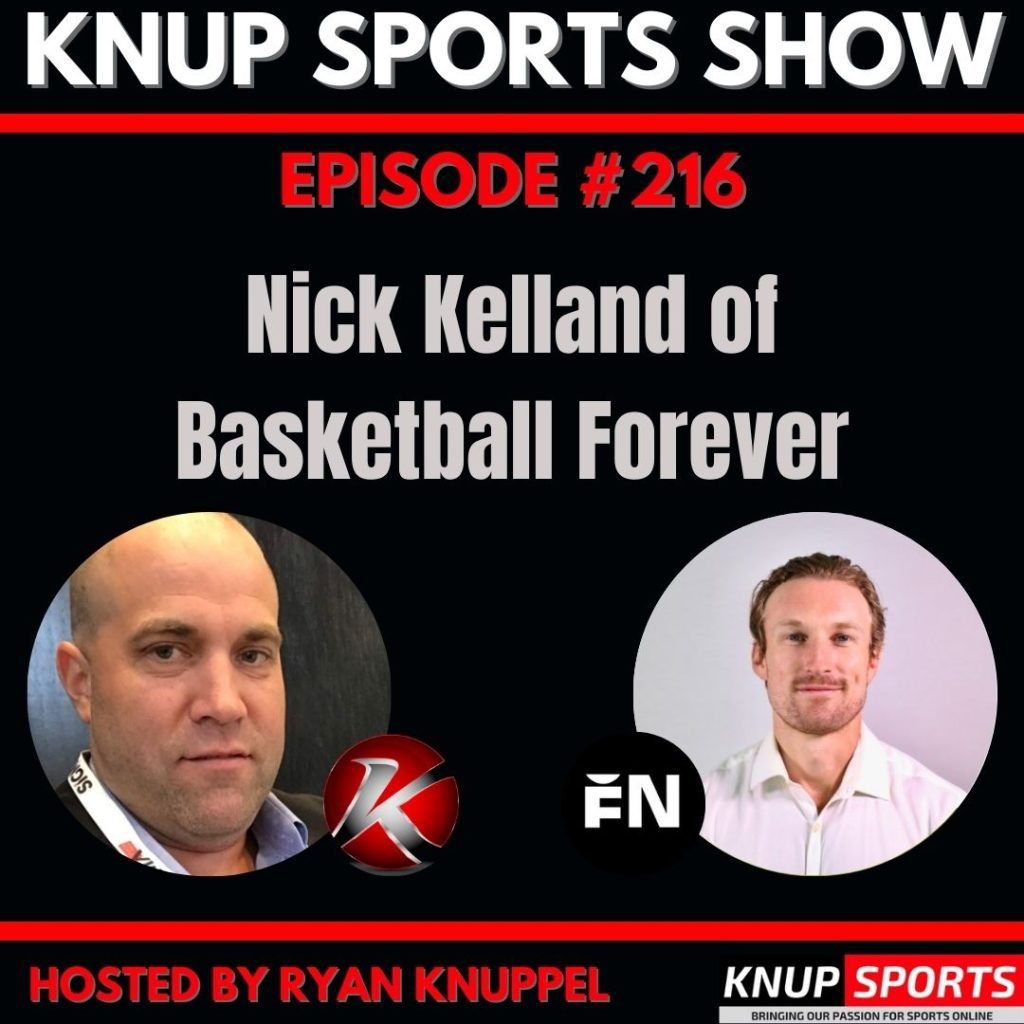
Relevant Guest Links
- Learn more about the Forever Network.
- You can connect with Nick Kelland on LinkedIn!
- Check out Basketball Forever at https://basketballforever.com/
More Knup Sports Links
- I refer to Knup Sports often in my show. That’s our sports passion site. Check out KnupSports.com here.
- If you are looking for sports content services you can find more information on the Knup Solutions website.
- Listen to more episodes of the Knup Sports Show.
- Want to be a guest on our show? Setup a time that works here.
- Subscribe to the Knup Sports Show on iTunes here.

